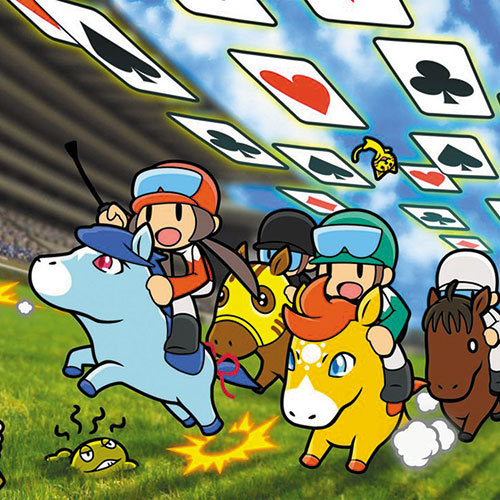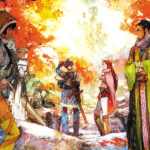COMPLEX AS IT IS, ‘JOCKEY’ STILL HITS ITS STRIDE

By Steve Watts | Shacknews.com
Since Nintendo’s announcement that it would move into the mobile space with the help of DeNA, it’s been hard not to view its handheld offerings through that lens. Every microtransaction strategy and touch mechanic seems primed for a steady transition toward iPhone and Android games. As a twist on solitaire, “Pocket Card Jockey” appears as if it could almost be a straight mobile port: a classic with a charming little veneer put over it. But it’s actually the mechanical complexity that makes this latest game from the Pokémon studio a strangely hard-to-put-down gem.
In most ways, Pocket Card Jockey defies easy categorization. Yes, it is mostly based on the familiar tropes of a lonely card game, but it builds in fundamental layers of strategy and simple role playing game mechanics on top of that foundation.
CARDS ON THE TABLE
A typical race consists of three to five quick, simplified solitaire games. Your performance during them determines how much stamina you burn and how much energy you can spend on positioning or banking for the final stretch. Especially poor performance will make your horse go berserk, and burn all of your stamina in one go. Each horse also has its own position preferences, which grant bonus energy, and a highlighted comfort area gives bonuses as well. You can also pick up special experience and skill cards on the track that are then obtained by making sure to match them during the next game of solitaire, and it all culminates in the final stretch portion where your energy is converted to an “enthusiasm” rating and you can burn extra energy cards for slight boosts. Plus you generally want to stay close to the edge, so as to not get penalized for taking an over-wide turn.
If that sounds strange and complicated, it is. Pocket Card Jockey is not an especially intuitive game, despite the lengthy tutorial that frankly overwhelms with information. It took me several races to piece together what did and didn’t work. This was aided somewhat — though not much — by the tutorial horse character Off Course popping up after every race to tell me what I did wrong. He quickly grew obnoxious, but he thankfully can be skipped.
The weakness of all these interlocking systems is that they ultimately rely on a game of chance. It’s frustrating to have your perfect strategy ruined by a last minute issue on the final lap because you were dealt a bad hand, and doubly so once Off Course pops up to lecture you on running out of stamina when it felt like you couldn’t help it.
OUT TO STUD
Ultimately, though, you win some and you lose some. As players we’re conditioned to expect to perform to perfection, but that simply isn’t possible here. Sometimes races don’t go your way, and that’s life. It’s a game of incremental progress. You race one horse to completion, or retire a real clunker early, and then adopt a new and usually slightly better horse to begin training them. Skill points lead to random buffs that occur when you need them, and you can always purchase some equipment before an especially big race.
If you do find and train up a mighty steed, you can use it to breed at the farm, and the offspring will be better than the average horses. Such is the life of a solitaire horse trainer: through several generations, you can make a real competitor. The little love balloons that signify a pairing are delivered with a wink and a nod, as if the game means to make sure we all understand the subtext.
In fact, that wry sense of humor is present throughout. The entire plot conceit, that playing solitaire impacts your performance in horse races, is developed at the beginning when your character mounts his or her first horse and is immediately thrown off and killed. Or almost killed, at least, as an ostensible guardian angel offers continued life in exchange for a promise that you’ll fulfill your life’s ambition of winning horse races. That your character insists that winning horse races isn’t actually his passion is irrelevant. The angel grants you horse-riding abilities tied to the one thing you actually are good at: computer solitaire.
The premise is goofy and charming in a way that we don’t always see from the studio, Game Freak, which usually plays it straight and earnest. It does have the thumbprint of Nintendo’s recent “Treehouse” all over it. Lest we forget this is the house Pokémon built, though, the trophy case is adorned with the words “Gotta Win ‘Em All” and you’ll often find yourself racing against horses with names like “Bulba Soar.”
JOCKEYING FOR POSITION
Make no mistake, “Pocket Card Jockey” is weird. The plot is ridiculous, the systems are obtuse and the reliance on luck can be incredibly frustrating. Despite all that, though, I kept promising myself just one more race, and then another, late into the night throughout my play sessions. Its complexity can be overwhelming, but once you hit your stride, it’s entertaining all the way to the home stretch.











